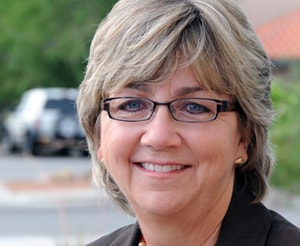
Lt. Gov. Diane Denish (Photo by Heath Haussamen
Republicans are accusing Democratic gubernatorial candidate Diane Denish of hypocrisy for attacking her opponent’s support of vouchers because Denish used to sit on the board of a foundation that has financially supported vouchers.
Denish is countering by saying foundations must abide by the intent of donors, and while she didn’t always agree with her uncle, who started the foundation, she was “honored to serve on the board and honor his intent.”
The state Republican Party put out a news release earlier this week claiming to expose Denish’s “voucher hypocrisy.” Denish served for several years on the board of the Daniels Fund – a foundation started by her uncle Bill Daniels, who died in 2000. She’s no longer on the board.
According to the state GOP, the Daniels Fund donated $100,000 to the Washington, D.C. school voucher program, and Daniels gave $250,000 to support a ballot initiative in Colorado that proposed giving tax credits to parents who send their children to private schools.
In the gubernatorial race, Denish has hammered her opponent, Republican Susana Martinez, for past statements in support of traditional voucher programs and for her current proposal, which includes vouchers for students with disabilities and tax credits for people who donate to scholarship programs.
State GOP spokeswoman Janel Causey hammered Denish for what the GOP news release called “hypocrisy.”
“What is now clear is that Dishonest Diane will say and do anything to remain in power, lying about her record as well as Susana Martinez’s,” Causey said. “As Governor Bill Richardson’s ‘good, loyal soldier,’ Denish has learned from the best when it comes to being dishonest and deceitful, and her role with the Daniels Fund is just the latest example.”
Denish said there’s no dishonesty or deceit on her part. She said she is “very proud of the time I served on the Daniels Fund Board because we worked very hard to create educational opportunities in the four states it serves, including New Mexico. Much of the education work of the board centered on providing college scholarships to underprivileged ‘diamonds in the rough’ students.”
“Apparently Susana Martinez and the Republicans do not understand that when you serve on a foundation board, you must abide by the intent of the donor,” Denish said. “I was very close to my Uncle Bill, and though we didn’t always agree politically, I was honored to serve on the board and honor his intent. I have always been an opponent of school vouchers because vouchers drain money from public schools.”
Denish: Martinez’s plan would take money from public schools

Susana Martinez
Martinez’s education plan includes vouchers for students with disabilities, but not for all other students. Instead, she’s proposing tax credits for people who donate to organizations that provide scholarships for poor children who want to attend a different school. Martinez, like Denish, now pledges not to cut funding for public education.
But Denish says it’s simple: Vouchers take money away from public education, and tax credits take money from the general fund which is used to fund public education. Thus, Denish says, Martinez’s plan will take money from public education.
Denish said donations made by the Daniels Fund are different because they are “private 501(c)3 dollars, not taxpayer funds or taxable dollars.”
“Therefore no money was ever drained from public schools as a result of donations made by the Daniels Fund,” she said. “But a Martinez voucher or tax credit plan? That directly diverts tax dollars that would have gone into public schools out of the funding stream and directly to private schools. That is wrong.”
To back up the claim that Martinez’s tax-credit plan would take money from public schools, the Denish campaign pointed to an Arizona Republic article that found that a similar program in that state had diverted $379 million in tax revenue over and 11-year period to scholarships for students to attend private schools.